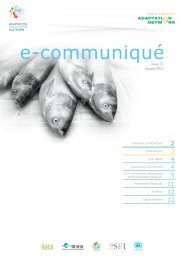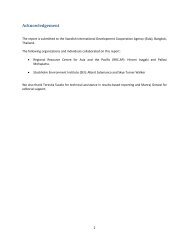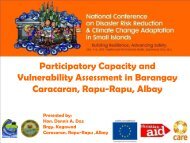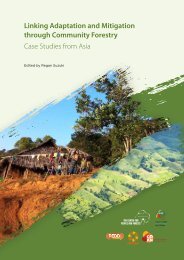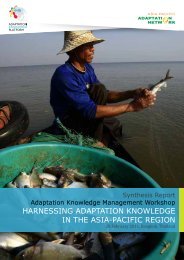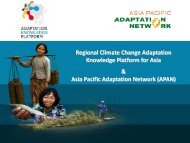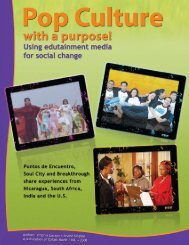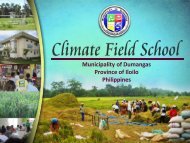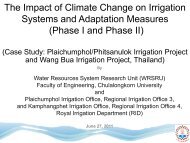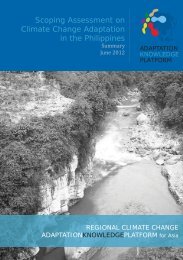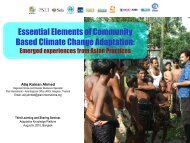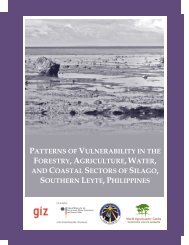Desktop Study on - Regional Climate Change Adaptation ...
Desktop Study on - Regional Climate Change Adaptation ...
Desktop Study on - Regional Climate Change Adaptation ...
Create successful ePaper yourself
Turn your PDF publications into a flip-book with our unique Google optimized e-Paper software.
Assessment of Capacity Gaps and Needs of South East Asia Countries<br />
in Addressing Impacts, Vulnerability and Adaptati<strong>on</strong> to <strong>Climate</strong> Variability and <strong>Climate</strong> <strong>Change</strong><br />
drought-mitigati<strong>on</strong> programmes are found in the<br />
study area.<br />
Indeed, many of above-menti<strong>on</strong>ed adaptati<strong>on</strong><br />
measures are still in the stage of capacity<br />
development, including training of ‘adaptati<strong>on</strong><br />
experts’ am<strong>on</strong>g agricultural extensi<strong>on</strong> teams, pilot<br />
projects implementati<strong>on</strong> in local communities,<br />
promoti<strong>on</strong> of rainwater harvesting techniques,<br />
enhancement of measures to decrease soil erosi<strong>on</strong><br />
and preserve genetic diversity in rice agriculture,<br />
design modificati<strong>on</strong> of reservoirs and irrigati<strong>on</strong><br />
channels to prevent risks from increased peak flows,<br />
and disseminati<strong>on</strong> of less<strong>on</strong>s learned to nati<strong>on</strong>al and<br />
internati<strong>on</strong>al levels (Solar, 2009). A key tool for this<br />
process of capacity development is a training manual<br />
developed by the Internati<strong>on</strong>al Center for Tropical<br />
Agriculture, the Stockholm Envir<strong>on</strong>ment Institute<br />
Figure 41: Level of vulnerability to drought by province<br />
(Cambodian <strong>Climate</strong> <strong>Change</strong> Office, 2005 cited<br />
in Ministry of Envir<strong>on</strong>ment, 2006)<br />
The latter activity, an assessment <strong>on</strong> climate<br />
change impacts <strong>on</strong> the water sector, has been<br />
implemented with a focus <strong>on</strong> the lower Mek<strong>on</strong>g<br />
basin including Cambodia by TKK and SEA START<br />
RC (2009). Their field studies identify key issues<br />
related to adaptive capacity and suggest relevant<br />
adaptati<strong>on</strong> strategies. Although local residents are<br />
well adapted to enormous seas<strong>on</strong>al variati<strong>on</strong> of the<br />
Tônlé Sap’s waters level and flow, their adaptive<br />
capacity towards unusual water regimes such as<br />
extensively high floods or sudden storms is relatively<br />
c<strong>on</strong>strained. In particular, that of the poorest groups<br />
is highly limited, since their low living standards<br />
and asset-base already worsen their vulnerability to<br />
unexpected climatic c<strong>on</strong>diti<strong>on</strong>s. Based <strong>on</strong> the study<br />
results, it is recommended to increase the general<br />
standard of living and the prerequisites to maintain<br />
a productive livelihood. For<br />
example, involvement in sec<strong>on</strong>dary<br />
and multiple livelihoods such as<br />
raising livestock and diversifying<br />
crop opti<strong>on</strong>s have allowed them to<br />
increase their asset’s base and, as<br />
a result, their resilience to possible<br />
climate changes (TKK and SEA<br />
START RC, 2009).<br />
and the United Nati<strong>on</strong>s Institute For Training<br />
and Research that guides and enables trainers to<br />
strengthen the capacity of participants engaged in<br />
the UNFCCC process, particularly in the domain of<br />
vulnerability and adaptati<strong>on</strong>. Moreover, capacity<br />
building for development of informati<strong>on</strong> systems is<br />
also promoted by the Department of Meteorology<br />
(DoM), in collaborati<strong>on</strong> with the Nati<strong>on</strong>al Hydraulic<br />
Research Institute of Malaysia, with focused areas<br />
of data colleti<strong>on</strong> and observati<strong>on</strong> related to weather<br />
and climate (Solar, 2009). The collaborati<strong>on</strong> further<br />
has extended into active engagement in formulating<br />
pilot adaptati<strong>on</strong> models that integrate local<br />
development processes, and also in joint assessment<br />
of climate change impacts <strong>on</strong> the water resources in<br />
the Mek<strong>on</strong>g Delta and Tônlé Sap (MoWRAM, 2008<br />
cited in Solar, 2009).<br />
Gaps Identified in<br />
Programmes and Studies<br />
Several gaps related to climate<br />
change and the water sector are<br />
identified at the workshop <strong>on</strong> “water<br />
and climate change in Cambodia”<br />
which was co-organised in Phnom<br />
Penh in February 2009 by Helsinki<br />
University of Technology, SEA<br />
START Regi<strong>on</strong>al Center and Royal<br />
University of Phnom Penh. These include uncertainty<br />
<strong>on</strong> the existing estimates <strong>on</strong> climate change impacts<br />
as well as lack of understanding <strong>on</strong> the changing<br />
factors including n<strong>on</strong>-envir<strong>on</strong>mental c<strong>on</strong>texts that<br />
affect the Tônlé Sap flood pulse system in different<br />
timescales (TKK, SEA START RC and RUPP, 2009).<br />
These gaps are summarised as follow:<br />
Uncertainty related to the existing estimates<br />
<strong>on</strong> climate change impacts remains still high<br />
owning to complexity of climatic-water systems<br />
and the l<strong>on</strong>g-term perspective reflected in the<br />
estimates. Hence, it is necessary to compare<br />
the findings from different estimates and<br />
to c<strong>on</strong>sider these estimates as <strong>on</strong>e possible<br />
projecti<strong>on</strong>. Of another importance is to view<br />
the l<strong>on</strong>g-term climate change separately from<br />
111



